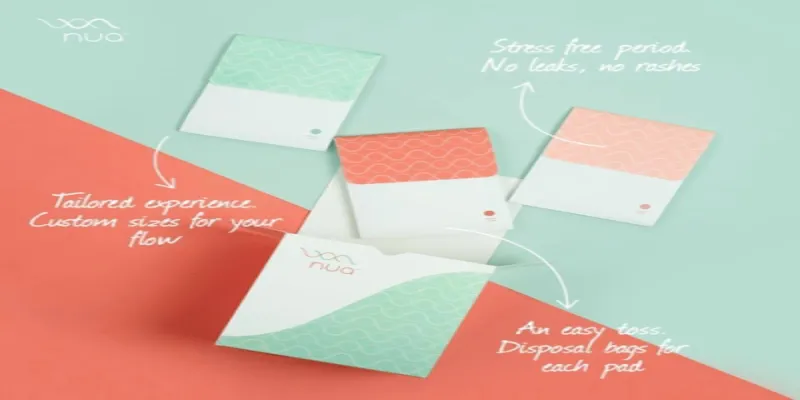When your flow is not even, why should your napkin size be, asks Nua Napkins
Mumbai-based sanitary napkin company lets women customise different-sized, chemical-free pads. The Nua website also offers medical tips and period reminders.
Nearly half the population gets it, and yet no one talks of it. Periods, chums, menstrual cycle, ‘that time of the month’ – call it what you want, but don’t speak about it.
In a society that refuses to talk of menstruation, and feminine hygiene products are still wrapped in newspaper and black poly bags, engineers Swathi Kulkarni and Ravishankar Ramachandran took on the challenge of not only designing and manufacturing a napkin that addresses the important aspects of hygiene and comfort, but also removing the taboo around carrying and storing it.
Nua Napkins, Ravishankar says, are made of non-woven fabric with an absorbent core, and come in an aesthetically-designed package. The napkins are not entirely biodegradable, and each pad is separately packed with a cover for easy disposal. Buying them is convenient; order them online, and they are home delivered.
“The pads do not contain any kind of prints, bleach, or dioxins. The perfume is used on the back of the pad instead of the surface to avoid direct exposure to skin, and is much lighter than other pads,” Ravishankar says. He says “extra-white” looking pads contain bleach, which breaks down into dioxin. Studies show dioxin is carcinogenic and can cause reproductive and developmental problems.
The Nua pads
Nua only sells online via its own website and now Amazon, and a customer can customise a pack of 12 pads based on her individual requirements, choosing from large ones for heavy flow days, a medium size, and small-sized pads for low flow. A pack of 12 pads costs Rs 169.

The website also offers medical tips to deal with rashes, chafing etc along with period reminders through mails.
The packaging for the pads and the disposable covers are made from paper. The co-founder says based on available medical research, they decided to design the pad with a lighter adhesive as any residue on innerwear can be a health hazard.
“A Korean scientist, who had headed Research and Development for a multinational sanitary napkin company, helped us design the pads. He has experience of 35 years in this market in the Asia-Pacific region,” Ravishankar says. The Nua napkins are manufactured in South Korea and packaged in India.
South Korean USP
The Bureau of Indian Standard (BIS) gives the ‘Indian Standard IS 5405’ certification for sanitary napkins, but it is not really mandatory for a manufacturer to pass these standards. Nua claims that not only does it does comply with BIS standards (tests for repeated strike through time, wet back, rates of absorbency, and total absorption capacity), but that it has also got an ISO 9001 certification from the South Korea Management Registrar.
Growing customer base
Since its inception in April this year, Swathi and Ravishankar say they have received “tremendous response”, and have more than 15,000 customers, mostly from smaller cities such as Ahmedabad, Varanasi, Vadodara, Ranchi etc. On average, Swathi says, “While first-time customers order two packs, return customers order more than three packs.”
The Indian sanitary napkin market valuation reached nearly $441 million in 2017, according to a report by Research and Markets. With a projection of touching $631 million by 2023, there is increased focus on menstrual hygiene. The Government of India this year scrapped the 12 percent Goods and Services Tax (GST) on sanitary napkins. Activists across the country hailed it as a positive move towards increasing accessibility and affordability of sanitary napkins.
Apart from large consumer goods companies, several social entrepreneurs are also manufacturing menstrual hygiene products that are organic and bio-degradable. In Kerala, an organisation named Kanika manufactures Soukyam pads from woodpulp and gel cotton, while Anandi pads are made from agri-waste such as banana fibre, bagasse, bamboo, and water hyacinth. These napkins follow BIS standards.
Though Nua retails on Amazon, the co-founders say customers can “get the full Nua experience through our website only”. They are now looking at offline delivery channels to increase the reach of their product. Although we are operating at a very small scale today, someday we hope and aspire to collaborate with government to cater to even lower economic rungs of the society,” Swathi adds.







